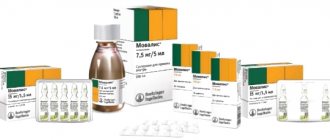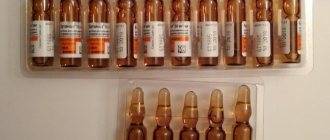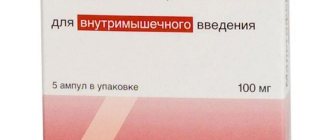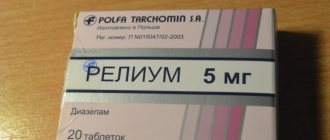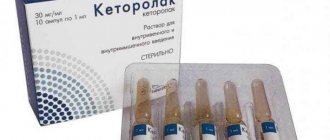Compound
- one tablet of the drug Sulpiride contains 50 or 200 mg of the active substance of the same name;
- 5 ml of oral solution contains 200 mg of Sulpiride as an active substance. Excipients: propyl hydroxybenzoate, methyl parahydroxybenzoate, propylene glycol, liquid maltitol, anise flavor, lemon flavor, citric acid monohydrate, water;
- 1 mg of drug solution for intramuscular administration contains 50 mg of Sulpiride as an active substance.
Release form
- For 50 mg tablets: 10 tablets in contour packaging, three packages in a paper pack; 30 tablets in a tinted glass jar, one jar in a paper pack.
- For 200 mg tablets: 10 tablets in contour packaging, three packages in a paper pack.
- Oral solution: colorless, transparent, with the smell of lemon or anise, depending on the flavor. 150 ml of this solution in an orange glass bottle, one bottle in a pack of paper.
- For a solution of the drug for intramuscular administration: 2 ml of solution in an ampoule, five ampoules in a contour package; two packages in a paper bundle; 2 ml of solution in an ampoule, ten ampoules in a pack of paper.
"SULPIRIDE": price in the pharmacy
The cost of the drug differs between pharmacies of different chains and regions by 5–15%. Approximate prices for 30 capsules of 200 mg in several online pharmacies:
- WER.RU – 145 rubles;
- Europharm – 167 rubles;
- Dialogue – 117 rubles;
- IFC pharmacy – 229 rubles;
- Maksavit – 157 rubles;
- Pharmacy - from 90 rubles.
The price of the injection solution in ampoules of 10 pieces per package is:
- WER.RU – 145 rubles;
- Europharm – 167 rubles;
- Dialogue – 117 rubles;
- IFC pharmacy – 229 rubles;
- Maksavit – 157 rubles;
Pharmacodynamics and pharmacokinetics
Pharmacodynamics
Atypical substituted benzamide antipsychotic.
Sulpiride has a moderate antipsychotic effect in combination with an activating and antidepressant effect. The neuroleptic effect is associated with an antidopaminergic effect. In the nervous system, Sulpiride inhibits only limbic dopaminergic receptors , and has almost no effect on the neostriatal system ; has an antipsychotic effect and causes a small number of adverse reactions. Peripheral action is based on suppression of presynaptic receptors. An increase in the amount of dopamine in the nervous system is usually associated with an improvement in psycho-emotional state and mood, and a decrease is associated with the appearance of symptoms of depression .
At a dose of up to 600 mg per day, the antidepressant and stimulating effect of the drug predominates, and at doses of 600 mg per day, its antipsychotic effect is manifested.
Does not affect drenergic , serotonin, cholinergic, histamine receptors and GABA (gamma-aminobutyric acid) receptors.
In small doses, it can be used as an additional remedy in the treatment of psychosomatic diseases, for example, in the relief of unwanted mental reactions in peptic ulcers . In case of irritable bowel, it reduces the severity of abdominal pain and improves the patient's condition.
Small doses of the drug, approximately 50-300 mg per day, are effective for dizziness regardless of the cause, stimulate the release of prolactin and have an antiemetic effect (central suppression of the vomiting center).
Pharmacokinetics
Oral administration: after internal use, the highest concentrations in the blood occur after approximately 4-5 hours. Bioavailability with this type of administration is 26-35%. The reaction with blood proteins does not exceed 40%. It is not metabolized and is excreted unchanged through the kidneys. The half-life is 7-8 hours. Also excreted in breast milk.
Intramuscular administration: after an intramuscular injection of 100 mg of the drug, the maximum concentration in plasma is recorded after half an hour. Plasma concentrations are usually dose proportional. The reaction with blood proteins also does not exceed 40%. The drug quickly penetrates into all organs and tissues of the body (the main part accumulates in the pituitary gland). It is excreted by the kidneys in its original form through glomerular filtration. The half-life is approximately 7 hours.
How does it affect the body? (Pharmacodynamics)
Sulpiride works as a neuroleptic, antipsychotic, and antiemetic. If the medicine enters the body:
- Interacts with dopamine receptors, in small quantities disinhibits the central nervous system. As the concentration increases, it stops productive symptoms (delusions, hallucinations, aggression and other manifestations of mental disorders).
- By blocking dopamine receptors and simultaneously normalizing motility in the gastrointestinal tract, it stops nausea and vomiting.
- Acts as an antidepressant without sedative effect.
- Regulates the functioning of the pituitary gland, increases the production of substances that improve blood supply to the stomach, restoration of the gastrointestinal mucosa.
- Reduces symptoms of autism.
- Helps with dizziness of any origin, tension headaches.
- Increases prolactin production, increasing milk production in nursing women.
The maximum concentration in the blood occurs 4 - 4.5 hours after taking the tablet. 96% of sulpiride is excreted from the body through the kidneys.
Indications for use
- schizophrenia of an acute or chronic nature;
- acute delirium ;
- neurotic disorders;
- depression regardless of etiology;
- dizziness of various etiologies ( vestibular neuritis, vertebrobasilar insufficiency, traumatic brain injury, Meniere's disease, otitis media );
- auxiliary treatment for peptic ulcers and irritable bowel syndrome .
Contraindications
- acute poisoning with ethyl alcohol, sleeping pills or analgesics ;
- hyperprolactinemia;
- hypersensitivity to the components of the drug;
- pheochromocytoma;
- patients in a state of aggression or affect , in whom there is a possibility of provoking symptoms;
- epilepsy;
- lactation;
- age up to 14 years.
It is necessary to prescribe the drug with caution to persons with kidney damage, Parkinson's disease , diseases of the blood vessels, heart, convulsive disorders and young women with irregular menstrual cycles , and elderly people.
Sulpiride-Belupo capsules 50 mg No. 20
special instructions
Neuroleptic malignant syndrome
Neuroleptic malignant syndrome is characterized by pallor, hyperthermia, muscle rigidity, dysfunction of the autonomic nervous system, and impaired consciousness. Signs of autonomic nervous system dysfunction, such as increased sweating and lability of blood pressure and pulse, may precede the onset of hyperthermia and therefore represent early warning symptoms. In case of unexplained increase in body temperature, treatment with sulpiride should be discontinued. The genesis of the development of neuroleptic malignant syndrome remains unclear; it is assumed that blockade of dopamine receptors in the striatum and hypothalamus plays a role in its mechanism; congenital predisposition (idiosyncrasy) cannot be ruled out. The development of the syndrome may be facilitated by intercurrent infection, dehydration, or organic brain damage.
QT prolongation
Sulpiride may cause QT prolongation. This effect is known to increase the risk of developing severe ventricular arrhythmias such as torsade de pointes (see Adverse Reactions section).
Before using the drug, if the patient's condition allows, it is necessary to exclude the presence of factors predisposing to the development of these severe rhythm disturbances (bradycardia less than 55 beats per minute, hypokalemia, hypomagnesemia, slowing of intraventricular conduction and congenital long QT interval or prolongation of the QT interval when using other drugs, extending the interval
QT) (see sections Precautions, Side effects).
Patients with the above risk factors should be careful when using sulpiride. Hypokalemia and hypomagnesemia must be corrected before starting to use the drug; in addition, medical supervision and constant monitoring of electrolytes in the blood and ECG should be ensured. Except in cases of urgent intervention, patients who require treatment with antipsychotics are recommended to have their condition assessed and an ECG taken.
Extrapyramidal syndrome
For extrapyramidal syndrome caused by antipsychotics, m-anticholinergic drugs (and not dopamine receptor agonists) should be used (see section Interactions with other drugs).
Stroke
In randomized clinical trials comparing some atypical antipsychotics with placebo in elderly patients with dementia, a threefold increase in the risk of cerebrovascular events was observed. The mechanism of this risk is unknown. An increase in this risk cannot be excluded with other antipsychotics or in other patient populations, so sulpiride should be used with caution in patients with risk factors for stroke.
Elderly patients with dementia
In elderly patients with dementia-related psychosis, an increased risk of death was observed when treated with antipsychotic drugs. An analysis of 17 placebo-controlled studies (mean duration greater than 10 weeks) found that most patients treated with atypical antipsychotics had a 1.6 to 1.7 times greater risk of death than patients treated with placebo. In a 10-week placebo-controlled study, the incidence of death in these patients when taking atypical antipsychotics was 4.5%, and when taking placebo - 2.6%. Although causes of death in clinical studies with atypical antipsychotics varied, most causes of death were either cardiovascular (heart failure, sudden death) or infectious (pneumonia) in nature. Observational studies have confirmed that, like treatment with atypical antipsychotic drugs, treatment with conventional antipsychotic drugs may also increase mortality. The extent to which the increase in mortality may be due to the antipsychotic drug rather than certain patient characteristics is unclear.
Venous thromboembolic complications
Cases of venous thromboembolic complications, sometimes fatal, have been observed with the use of antipsychotic drugs. Therefore, sulpiride should be used with caution in patients with risk factors for the development of venous thromboembolic complications (see sections Precautions, Side effects).
Patients with epilepsy
Due to the fact that antipsychotics can lower the epileptogenic threshold, when using sulpiride in patients with epilepsy, the latter should be under strict medical supervision.
Patients with Parkinson's disease receiving dopamine receptor agonists
Except in exceptional cases, sulpiride should not be used in patients with Parkinson's disease. If there is an urgent need for antipsychotic treatment in patients with Parkinson's disease taking dopamine receptor agonists, a gradual reduction in doses of the latter should be carried out until complete withdrawal (abrupt withdrawal of dopamine receptor agonists may increase the risk of developing
patient with neuroleptic malignant syndrome) (see sections Precautions, Interactions with other drugs).
Patients with impaired renal function
Reduced doses should be used (see section Dosage and Administration).
Patients with diabetes mellitus or risk factors for developing diabetes mellitus
Since the development of hyperglycemia has been reported in patients taking atypical antipsychotic drugs, patients with an established diagnosis of diabetes mellitus or with risk factors for its development who are prescribed treatment with sulpiride should monitor blood glucose concentrations.
Ethanol
The consumption of alcoholic beverages containing ethanol or the use of medications containing ethanol during treatment with sulpiride is strictly prohibited.
Use in children
Due to the effect of sulpiride on cognitive processes in children, it is necessary to monitor learning ability annually. It is necessary to regularly adjust the dose taking into account the clinical condition of the child.
Leukopenia, neutropenia and agranulocytosis
The development of leukopenia, neutropenia and agranulocytosis has been reported when taking antipsychotic drugs. Unexplained infections or fever may be a manifestation of a blood disorder and require immediate hematologic evaluation.
Lactose
The drug should not be used in patients with lactase deficiency, galactose intolerance and glucose-galactose intolerance.
malabsorption.
Side effects
- Reactions from the digestive tract: diarrhea , dry mouth, heartburn , vomiting, nausea, increased levels of alkaline phosphatase and transaminases in the blood.
- Reactions from the hormonal system: galactorrhea, reversible hyperprolactinemia, impotence, gynecomastia, changes in the menstrual cycle, frigidity .
- Reactions from the nervous system: drowsiness , sedation , dizziness , oral automatism, tremor , headache , extrapyramidal syndrome, akathisia, dyskinesia, aphasia, agitation, anxiety, sleep disorder, irritability, visual impairment. If hyperthermia occurs, the drug must be discontinued, since an increase in body temperature indicates the possibility of neuroleptic malignant syndrome.
- Reactions from the circulatory system: prolongation of the QT interval, tachycardia , orthostatic hypotension, dizziness, changes in blood pressure, arrhythmia.
- Allergic reactions: itching, rash , eczema.
- Also during therapy, increased sweating and weight gain may occur.
Sulpirid
Neuroleptic malignant syndrome
Neuroleptic malignant syndrome (NMS), a potentially fatal complication, is characterized by hyperthermia, muscle rigidity, dysfunction of the autonomic nervous system, impaired consciousness, and increased levels of creatine phosphokinase in the blood plasma. In case of hyperthermia, which is one of the elements of NMS, the drug must be discontinued.
Alcohol
The patient should be warned not to drink alcohol during treatment with sulpiride.
Elderly patients with dementia
In elderly patients with dementia, an increased risk of death was observed when treated with antipsychotic drugs. The causes and extent of the increase in mortality are unknown.
Extrapyramidal syndrome
If extrapyramidal reactions occur, it may be necessary to reduce the dose of sulpiride or prescribe antiparkinsonian drugs.
Patients with epilepsy
Due to the fact that antipsychotics can lower the epileptogenic threshold, when prescribing sulpiride to patients with epilepsy, the latter should be under strict medical supervision. The dose of antiepileptic drugs does not change.
Stroke
In randomized clinical trials conducted in elderly patients with dementia, a 3-fold increase in the risk of cerebrovascular complications was observed when atypical antipsychotics were prescribed. The mechanism of this risk is unknown. An increase in this risk cannot be ruled out with other antipsychotics or in other patient populations, so sulpiride should be used with caution in patients with risk factors for stroke.
Venous thromboembolic complications
Cases of venous thromboembolic complications, sometimes fatal, have been observed with the use of antipsychotic drugs. Therefore, sulpiride should be used with caution in patients with risk factors for the development of venous thromboembolic complications.
Prolongation of the QT interval
Sulpiride may cause QT prolongation. This effect increases the risk of developing severe ventricular arrhythmias such as torsade de pointes (TdP). Before use, if the patient's condition allows, it is necessary to exclude the presence of factors predisposing to the development of these severe rhythm disturbances (bradycardia less than 55 beats per minute, electrolyte disturbances, in particular hypokalemia, congenital prolongation of the QT interval, simultaneous use of drugs that prolong the QT interval). Patients with the above risk factors should be careful when prescribing sulpiride.
Patients with Parkinson's disease taking dopamine receptor agonists
Except in exceptional cases, sulpiride should not be used in patients with Parkinson's disease. Patients receiving dopamine receptor agonists require close monitoring for worsening parkinsonism and mental status.
Patients with impaired renal function
It is necessary to reduce the dose and titrate it in small portions.
Photosensitivity
The drug in high doses can cause photosensitivity. It is recommended to avoid exposure to direct sunlight while using the drug.
Leukopenia, neutropenia and agranulocytosis
During therapy with antipsychotics, including sulpiride, leukopenia, neutropenia and agranulocytosis were observed. The development of unexplained infections or an increase in body temperature may be signs of blood disorders, which require immediate hematological studies.
Other antipsychotics
Concomitant use with other antipsychotics should be avoided.
Excipients
The drug contains maltitol, so it should not be prescribed to patients with hereditary fructose intolerance.
In addition, the drug contains preservatives (parabens), which can cause allergic reactions (including delayed ones).
Withdrawal syndrome
Abruptly stopping the drug may cause withdrawal symptoms.
Instructions for use of Sulpiride (Method and dosage)
Instructions for use for Sulpiride recommend the following dosages:
- adults, when taken orally, are prescribed 100-300 mg per day in two or three doses;
- adults, when administered intramuscularly, are prescribed 100-800 mg per day;
- Children are prescribed a daily dose of 5 mg/kg.
The highest daily dose for adults when taken orally is 1.6 g.
The solution for internal use must be shaken before use.
Interaction
Concomitant use with drugs that depress nervous activity ( antihistamines, narcotic analgesics, barbiturates, benzodiazepines ) can lead to stimulation of the sedative effect of these drugs.
Co-administration with levodopa due to the phenomena of mutual antagonism.
When used simultaneously with lithium drugs, extrapyramidal disorders may occur
There is an increased risk of orthostatic hypotension when taken concomitantly with antihypertensive agents.
Analogues of Sulpiride
Level 4 ATX code matches:
Solian
Tiapridal
Prosulpin
Betamax
Tiapride
Eglonil
The following are the most well-known analogues: Betamax, Sulpiride Eglanil, Vero-Sulpiride, Sulpiride Belupo, Prosulpin, Eglek, Eglonil, Sulpiride-ZN, Restful.
"SULPIRIDE": analogues and their price
Atypical antipsychotics with the same active ingredient are produced by several companies from different countries. Analogues of sulpiride:
| Sulpiride Belupo - tablets from the Croatian company Belupo are identical in composition to the domestic Sulperide. Used to treat depression, acute and chronic forms of schizophrenia, and neurotic disorders. Price – 103 rubles. |
| Betamax is an antidepressant produced by Latvian pharmaceutical company. It has a neuroliptic effect and is used in the treatment of neurotic, depressive and schizophrenic disorders. Price – 233 rubles. |
| Prosulpin is a Czech antipsychotic. Indications for use include depressive states, schizophrenic disorders, neuroses, and behavioral disorders. Price – 248 rubles. |
| Eglonil is a French neuroprotector produced by the SANOFI-AVENTIS FRANCE corporation in the form of tablets, capsules and solution for injections. Taken for psychosomatic disorders, abulia, neuroses, psychoses, confused consciousness, and sluggish forms of schizophrenia. Price – from 200 rubles. |
Sulpiride price, where to buy
The price of Sulpiride in tablets of 50 mg No. 30 in Russia is 43-48 rubles, and in ampoules No. 10 – 96-115 rubles.
In Ukraine, the price of a similar form of release in tablets starts from 52 hryvnia.
- Online pharmacies in RussiaRussia
- Online pharmacies in UkraineUkraine
ZdravCity
- Sulpiride Belupo capsules 200 mg 12 pcs. Belupo
107 rub. order - Sulpiride tablets 200 mg 30 pcs. JSC Organika
138 RUR order
- Sulpiride Belupo capsules 50 mg 30 pcs.Belupo
91 rub. order
- Sulpiride solution for intramuscular injection. 50 mg/ml 2 ml 10 pcs. JSC Organika
128 rub. order
Pharmacy Dialogue
- Sulpiride (caps. 200 mg No. 12)Belupo
118 RUR order
show more
Pharmacy24
- Sulpiride 50 mg No. 24 capsules TOV Teva Operations Poland, Poland
110 UAH. order - Sulpiride 100 mg No. 24 capsules TOV Teva Operations Poland, Poland
146 UAH order
- Sulpiride 200 mg No. 12 tablets TOV Teva Operations Poland, Poland
159 UAH order
"SULPIRIDE": patient reviews
Sulpiride was prescribed to my grandfather when he developed psychosis with dementia. They replaced it with haloperidol. After haloperidol, my grandfather was like a doll and his hands were shaking. But on sulpiride nothing like this happened. He became calmer, we started sleeping at night instead of guarding him. I was very pleased that the tablets were cheap: less than 100 rubles.
I took sulpiride for migraines. To be honest, I’m ready to bow at the feet of the one who invented it! Anyone who has ever experienced a migraine will understand: sounds, smells, and light irritate me. Even the movement of air across the face (a breeze or someone passing by) causes a wild attack of headache that cannot be relieved by anything. The ambulance lived with me at such moments. Well, the neurologist sent me to a psychiatrist, I didn’t want to go yet. There the doctor gave a prescription for sulpiride. He told me how to drink it. I can’t say that the migraines have disappeared, but now it has become a mild ailment, and not a catastrophe.
My husband is an alcoholic and has had delirium tremens several times. He got stitched up, but stopped sleeping and became aggressive and irritable. The doctor prescribed him sulpiride 50 mg twice a day. At least he became a man! And he himself said that he sleeps better, eats with appetite, gets tired less, no one annoys him now.
